仁爱版九上全册英语重点短语 句式 句型 语法
- 格式:pdf
- 大小:532.26 KB
- 文档页数:16
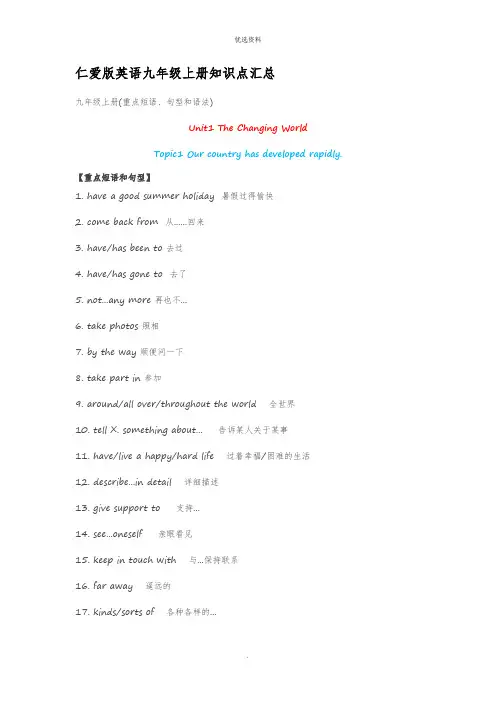
仁爱版英语九年级上册知识点汇总九年级上册(重点短语、句型和语法)Unit1 The Changing WorldTopic1 Our country has developed rapidly.【重点短语和句型】1. have a good summer holiday 暑假过得愉快2. come back from 从......回来3. have/has been to 去过4. have/has gone to 去了5. not...any more 再也不...6. take photos 照相7. by the way 顺便问一下8. take part in 参加9. around/all over/throughout the world 全世界10. tell X. something about... 告诉某人关于某事11. have/live a happy/hard life 过着幸福/困难的生活12. describe...in detail 详细描述13. give support to 支持...14. see...oneself 亲眼看见15. keep in touch with 与...保持联系16. far away 遥远的17. kinds/sorts of 各种各样的...18. not only...but also 不仅...而且...19. make progress 取得进步20. more than/over 多于21. develop/improve rapidly 迅速开展/改善22. tell X. (not ) to do sth. 告诉某人〔别〕做某事23. ask X. (not ) to do sth. 要求某人〔别〕做某事24. in order to do sth. 为了做某事25. have to do sth. 不得不做某事26. It's +形容词+for X. to do sth. 对于某人来说做某事是...的27. why not do sth.=wh y don’t you do sth为什么不做某事28. succeed/be successful in doing sth. 成功地做某事29. dream about doing sth. 梦想做某事30. see/hear X. do/doing sth. 看见/听见某人做/正在做某事【重点语法】现在完成时一. 现在完成时的根本结构肯定句:主语+have/has+Ved (动词的过去分词)+其他否认句:主语+have/has+not+Ved (动词的过去分词)+其他一般疑问句:Have/Has+主语+Ved (动词的过去分词)+其他特别疑问句:特别疑问词+一般疑问句语序〔have/has+主语+过去分词+其他〕,把划线词去掉二. 现在完成时的用法态发生在过去但它的影响现在还存在,强调的是现在。
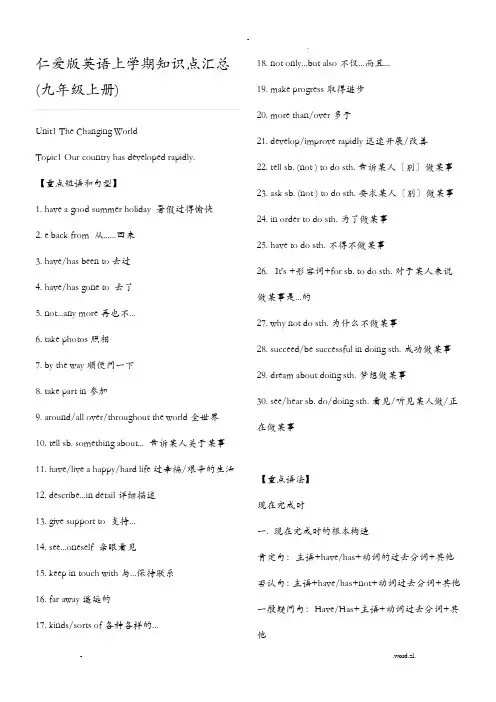
仁爱版英语上学期知识点汇总(九年级上册)Unit1 The Changing WorldTopic1 Our country has developed rapidly.【重点短语和句型】1. have a good summer holiday 暑假过得愉快2. e back from 从......回来3. have/has been to 去过4. have/has gone to 去了5. not...any more 再也不...6. take photos 照相7. by the way 顺便问一下8. take part in 参加9. around/all over/throughout the world 全世界10. tell sb. something about... 告诉某人关于某事11. have/live a happy/hard life 过幸福/艰辛的生活12. describe...in detail 详细描述13. give support to 支持...14. see...oneself 亲眼看见15. keep in touch with 与...保持联系16. far away 遥远的17. kinds/sorts of 各种各样的... 18. not only...but also 不仅...而且...19. make progress 取得进步20. more than/over 多于21. develop/improve rapidly 迅速开展/改善22. tell sb. (not ) to do sth. 告诉某人〔别〕做某事23. ask sb. (not ) to do sth. 要求某人〔别〕做某事24. in order to do sth. 为了做某事25. have to do sth. 不得不做某事26. It's +形容词+for sb. to do sth. 对于某人来说做某事是...的27. why not do sth. 为什么不做某事28. succeed/be successful in doing sth. 成功做某事29. dream about doing sth. 梦想做某事30. see/hear sb. do/doing sth. 看见/听见某人做/正在做某事【重点语法】现在完成时一. 现在完成时的根本构造肯定句:主语+have/has+动词的过去分词+其他否认句:主语+have/has+not+动词过去分词+其他一般疑问句:Have/Has+主语+动词过去分词+其他特殊疑问句:特殊疑问词+一般疑问句〔have/has+主语+过去分词+其他〕二. 现在完成时的用法1. 现在完成时用来表示过去已经完成的动作对现在造成影响或后果。
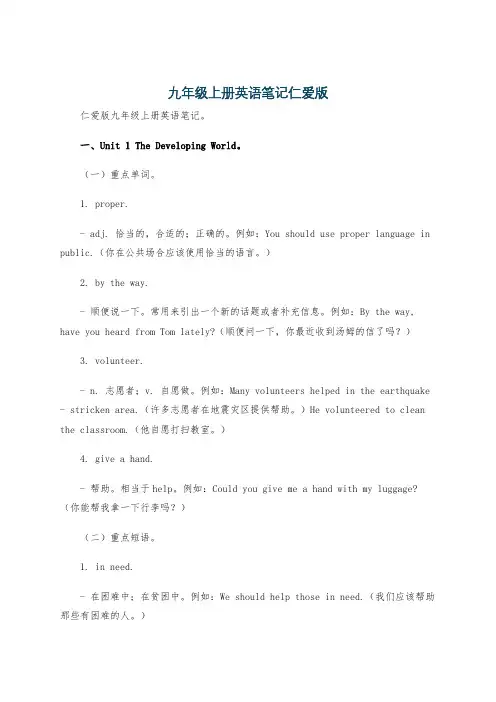
九年级上册英语笔记仁爱版仁爱版九年级上册英语笔记。
一、Unit 1 The Developing World。
(一)重点单词。
1. proper.- adj. 恰当的,合适的;正确的。
例如:You should use proper language in public.(你在公共场合应该使用恰当的语言。
)2. by the way.- 顺便说一下。
常用来引出一个新的话题或者补充信息。
例如:By the way, have you heard from Tom lately?(顺便问一下,你最近收到汤姆的信了吗?)3. volunteer.- n. 志愿者;v. 自愿做。
例如:Many volunteers helped in the earthquake - stricken area.(许多志愿者在地震灾区提供帮助。
)He volunteered to clean the classroom.(他自愿打扫教室。
)4. give a hand.- 帮助。
相当于help。
例如:Could you give me a hand with my luggage?(你能帮我拿一下行李吗?)(二)重点短语。
1. in need.- 在困难中;在贫困中。
例如:We should help those in need.(我们应该帮助那些有困难的人。
)2. come for a visit.- 来参观;来访问。
例如:My friends will come for a visit next week.(我的朋友们下周将来参观。
)(三)重点句型。
1. Have you come back from your hometown?- 这是一个现在完成时的一般疑问句。
其结构为“Have/Has+主语+过去分词+其他”。
回答可以是Yes, I have.或者No, I haven't.2. There goes the bell.- 这是一个倒装句。
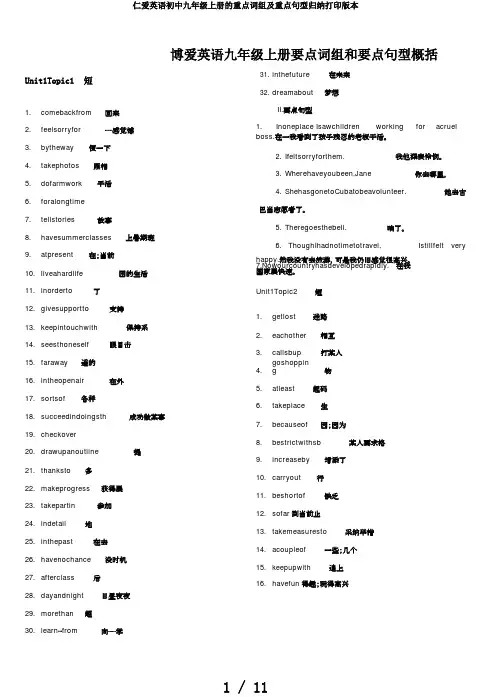
博爱英语九年级上册要点词组和要点句型概括Unit1Topic1短ebackfrom回来2.feelsorryfor⋯⋯感觉憾3.bytheway便一下4.takephotos照相5.dofarmwork干活6.foralongtime7.tellstories故事8.havesummerclasses上暑期班9.atpresent在;当前10.liveahardlife困的生活11.inorderto了12.givesupportto支持13.keepintouchwith保持系14.seesthoneself眼目击15.faraway遥的16.intheopenair在外17.sortsof各样18.succeedindoingsth成功做某事19.checkover20.drawupanoutline提21.thanksto多22.makeprogress获得展23.takepartin参加24.indetail地25.inthepast在去26.havenochance没时机27.afterclass后28.dayandnight日昼夜夜29.morethan超30.learn⋯from向⋯⋯学31.inthefuture在未来32.dreamabout梦想II.要点句型1. Inoneplace Isawchildren working for acruel boss.在一我看到了孩子残忍的老板干活。
2.Ifeltsorryforthem.我他深表怜悯。
3.Wherehaveyoubeen,Jane你去哪里,4.ShehasgonetoCubatobeavolunteer.她去古巴当志愿者了。
5.Theregoesthebell.响了。
6.ThoughIhadnotimetotravel,Istillfelt very happy.然我没有去旅游,可是我仍旧感觉很高兴。
7.Nowourcountryhasdevelopedrapidly.在我国家展快速。
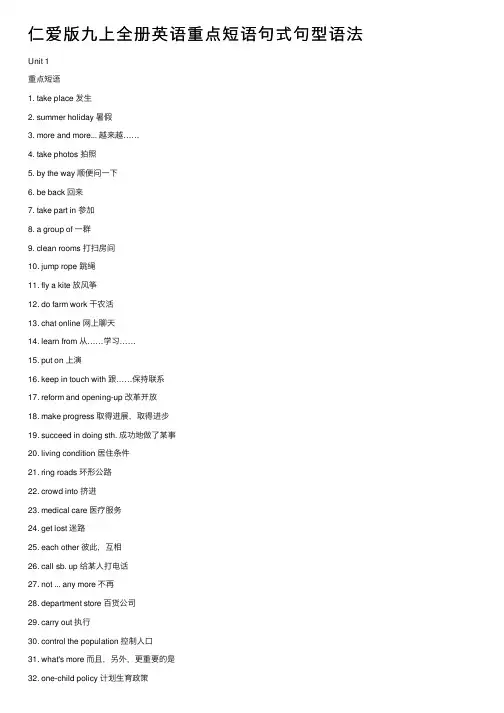
仁爱版九上全册英语重点短语句式句型语法Unit 1重点短语1. take place 发⽣2. summer holiday 暑假3. more and more... 越来越……4. take photos 拍照5. by the way 顺便问⼀下6. be back 回来7. take part in 参加8. a group of ⼀群9. clean rooms 打扫房间10. jump rope 跳绳11. fly a kite 放风筝12. do farm work ⼲农活13. chat online ⽹上聊天14. learn from 从……学习……15. put on 上演16. keep in touch with 跟……保持联系17. reform and opening-up 改⾰开放18. make progress 取得进展,取得进步19. succeed in doing sth. 成功地做了某事20. living condition 居住条件21. ring roads 环形公路22. crowd into 挤进23. medical care 医疗服务24. get lost 迷路25. each other 彼此,互相26. call sb. up 给某⼈打电话27. not ... any more 不再28. department store 百货公司29. carry out 执⾏30. control the population 控制⼈⼝31. what's more ⽽且,另外,更重要的是32. one-child policy 计划⽣育政策33. so far 到⽬前为⽌34. take measures to do sth 采取措施做某事35. thanks to 幸亏,由于36. because of 因为;由于37. living conditions ⽣活条件38. deal with 处理39. as a matter of fact 事实上,其实40. millions of ⼤量;数以百万计41. stand for 代表42. theater industry 影院⾏业43. return to work 重返⼯作岗位44. live a normal life 过正常⽣活45. in need 在困难中的46. decide on 决定;选定47. medical treatment 治疗;医疗48. provide sb with sth 向某⼈提供某物49. in order to 为了50. have a problem with 在……(⽅⾯)有问题51. on purpose 故意,有意地52. according to 据……所说,按……所报道53. child labor 童⼯句式梳理1. have/has been to ...【解析】have/has been to ... 意为“(某⼈)曾经到过……”。
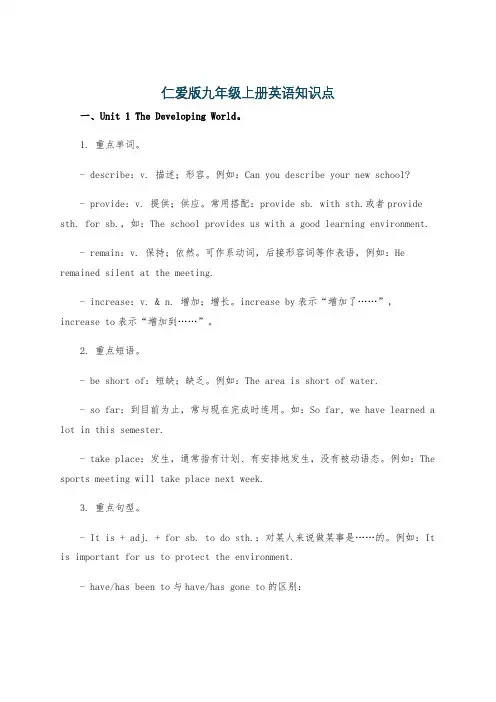
仁爱版九年级上册英语知识点一、Unit 1 The Developing World。
1. 重点单词。
- describe:v. 描述;形容。
例如:Can you describe your new school?- provide:v. 提供;供应。
常用搭配:provide sb. with sth.或者provide sth. for sb.,如:The school provides us with a good learning environment.- remain:v. 保持;依然。
可作系动词,后接形容词等作表语,例如:He remained silent at the meeting.- increase:v. & n. 增加;增长。
increase by表示“增加了……”,increase to表示“增加到……”。
2. 重点短语。
- be short of:短缺;缺乏。
例如:The area is short of water.- so far:到目前为止,常与现在完成时连用。
如:So far, we have learned a lot in this semester.- take place:发生,通常指有计划、有安排地发生,没有被动语态。
例如:The sports meeting will take place next week.3. 重点句型。
- It is + adj. + for sb. to do sth.:对某人来说做某事是……的。
例如:It is important for us to protect the environment.- have/has been to与have/has gone to的区别:- have/has been to表示“去过某地(已经回来)”,例如:I have been to Beijing twice.- have/has gone to表示“去了某地(还没回来)”,例如:He has gone to Shanghai on business.二、Unit 2 Saving the Earth。
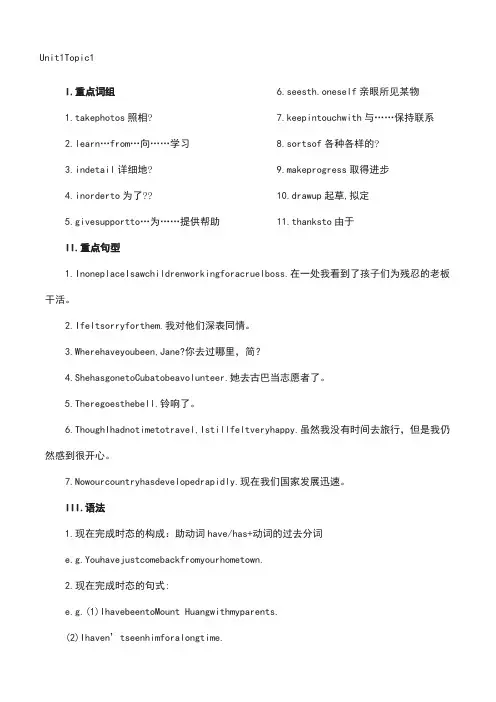
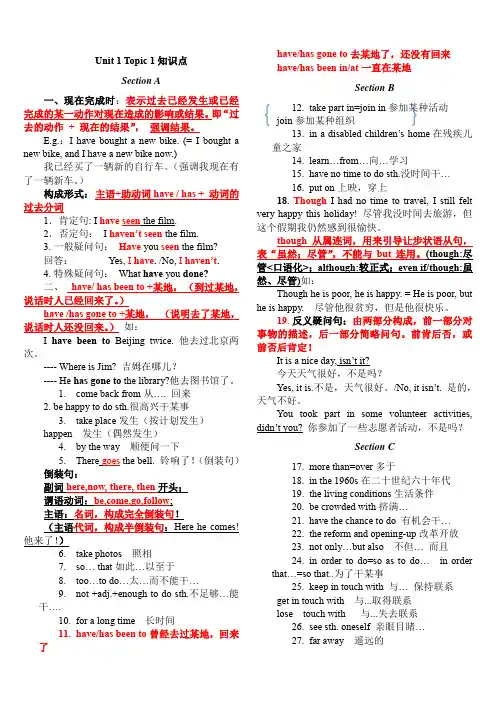
Unit 1 Topic 1知识点Section A一、现在完成时:表示过去已经发生或已经完成的某一动作对现在造成的影响或结果。
即“过去的动作+ 现在的结果”,强调结果。
E.g.:I have bought a new bike. (= I bought a new bike, and I have a new bike now.)我已经买了一辆新的自行车。
(强调我现在有了一辆新车。
)构成形式:主语+助动词have / has + 动词的过去分词1.肯定句: I have seen the film.2.否定句:I haven’t seen the film.3.一般疑问句:Have you seen the film?回答:Yes, I have. /No, I haven’t.4.特殊疑问句:What have you done?二、have/ has been to +某地,(到过某地,说话时人已经回来了。
)have /has gone to +某地,(说明去了某地,说话时人还没回来。
)如:I have been to Beijing twice. 他去过北京两次。
---- Where is Jim? 吉姆在哪儿?---- He has gone to the library?他去图书馆了。
e back from从…. 回来2. be happy to do sth.很高兴干某事3.take place发生(按计划发生)happen 发生(偶然发生)4.by the way 顺便问一下5.There goes the bell. 铃响了!(倒装句)倒装句:副词here,now, there, then开头;谓语动词:be,come,go,follow;主语:名词,构成完全倒装句!(主语代词,构成半倒装句:Here he comes! 他来了!)6.take photos 照相7.so… that如此…以至于8.too…to do…太…而不能干…9.not +adj.+enough to do sth.不足够…能干….10.for a long time 长时间11.have/has been to曾经去过某地,回来了have/has gone to去某地了,还没有回来have/has been in/at一直在某地Section B12.take part in=join in参加某种活动join参加某种组织13.in a disabled children’s home在残疾儿童之家14.learn…from…向…学习15.have no time to do sth.没时间干…16.put on上映,穿上18. Though I had no time to travel, I still felt very happy this holiday! 尽管我没时间去旅游,但这个假期我仍然感到很愉快。
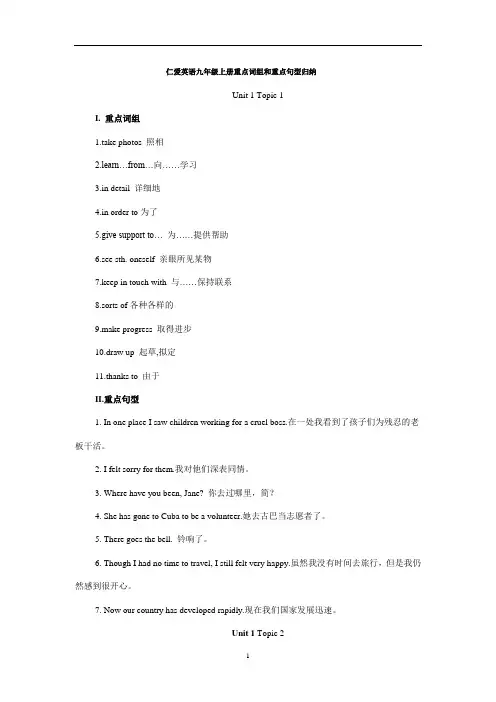
仁爱英语九年级上册重点词组和重点句型归纳Unit 1 Topic 1I.重点词组1.take photos 照相2.learn…from…向……学习3.in detail 详细地4.in order to为了5.give support to… 为……提供帮助6.see sth. oneself 亲眼所见某物7.keep in touch with 与……保持联系8.sorts of各种各样的9.make progress 取得进步10.draw up 起草,拟定11.thanks to 由于II.重点句型1. In one place I saw children working for a cruel boss.在一处我看到了孩子们为残忍的老板干活。
2. I felt sorry for them.我对他们深表同情。
3. Where have you been, Jane? 你去过哪里,简?4. She has gone to Cuba to be a volunteer.她去古巴当志愿者了。
5. There goes the bell. 铃响了。
6. Though I had no time to travel, I still felt very happy.虽然我没有时间去旅行,但是我仍然感到很开心。
7. Now our country has developed rapidly.现在我们国家发展迅速。
Unit 1 Topic 2I.重点词组1. get lost 迷路2. each other 彼此3.at least 至少4take place发生5because of 因为6.be strict with sb. 对某人严格要求7.carry out 实行8.be short of 缺乏9.take measures to do sth.采取措施做某事10.be known as… 作为……而著名11.work well in doing…在……方面起作用12.a couple of 一些13keep up with赶上,跟上II.重点句型1. Have you found him yet? 你已经找到他了吗?2. ——I really hate to go shopping. 我的确讨厌购物。
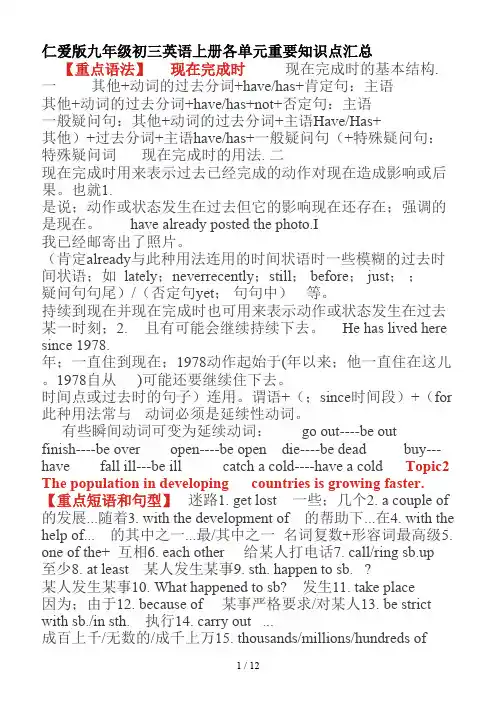
仁爱版九年级初三英语上册各单元重要知识点汇总【重点语法】现在完成时现在完成时的基本结构.一其他+动词的过去分词+have/has+肯定句:主语其他+动词的过去分词+have/has+not+否定句:主语一般疑问句:其他+动词的过去分词+主语Have/Has+其他)+过去分词+主语have/has+一般疑问句(+特殊疑问句:特殊疑问词现在完成时的用法. 二现在完成时用来表示过去已经完成的动作对现在造成影响或后果。
也就1.是说;动作或状态发生在过去但它的影响现在还存在;强调的是现在。
have already posted the photo.I我已经邮寄出了照片。
(肯定already与此种用法连用的时间状语时一些模糊的过去时间状语;如 lately;neverrecently;still; before; just;;疑问句句尾)/(否定句yet;句句中)等。
持续到现在并现在完成时也可用来表示动作或状态发生在过去某一时刻;2. 且有可能会继续持续下去。
He has lived here since 1978.年;一直住到现在;1978动作起始于(年以来;他一直住在这儿。
1978自从 )可能还要继续住下去。
时间点或过去时的句子)连用。
谓语+(;since时间段)+(for 此种用法常与动词必须是延续性动词。
有些瞬间动词可变为延续动词: go out----be out finish----be over open----be open die----be dead buy---have fall ill---be ill catch a cold----have a cold Topic2 The population in developing countries is growing faster.【重点短语和句型】迷路1. get lost 一些;几个2. a couple of 的发展...随着3. with the development of 的帮助下...在4. with the help of... 的其中之一...最/其中之一名词复数+形容词最高级5. one of the+ 互相6. each other 给某人打电话7. call/ring sb.up 至少8. at least 某人发生某事9. sth. happen to sb. ?某人发生某事10. What happened to sb? 发生11. take place因为;由于12. because of 某事严格要求/对某人13. be strict with sb./in sth. 执行14. carry out ...成百上千/无数的/成千上万15. thousands/millions/hundreds oftwo thousand/million/hundred 16. s)具体数字后面不加(百/百万/两千 ... 一半17. half of...三分之二18. two thirds ... 短缺19. be short of 20. so far到目前为止而闻名...因21. be known/famous for而闻名...作为22. be known/famous as ... 幸亏23. thanks to有很长的路要走24. have a long way to go的镇...一个叫做25. a town called... 少于26. fewer than/lessthan 名胜古迹27. places of interest 感兴趣...对28. be interestedin 29. such as ... 例如 ... 尝起来/摸/听/闻/看形容词30.look/smell/sound/feel/taste+ +sb./sth 形容词31. such a/an+物/的人...如此带某人去某地32. take sb. to sp 赶上33. keepup with 做某事很愉快34. have fun doing sth. ...有35. have a population of... 的人口有多少人口?36. What's the population of...? ... 想要做某事37. want to do sth. 讨厌做某事38. hate todo sth 采取措施做某事39. take measures to do sth.时间做某事/有机会40. have(no)chance/time to do sth.过去常常做某事41. used to do sth. 被用来做某事42. be used todo sth. 习惯做某事43. be/get used to doing sth.方面起到显著作用...在44. work well in doing sth.【重点语法】 already; just ; yet; ever; never;recently.常用于现在完成时的时间状语: e.g. 1. I have just called you. Have you ever been to France?——2. been to any European countries.——No; I’ve never Have you seen him yet? ——3. Yes; I have seen him already.—— Topic3 Theworld has changed for the better.【重点短语】用这些钱1.with the money 为了;以致于2. so that ...如此3. so...that... ...以致于事实上4. in fact/as a matter of fact 来参观在困难时6.in need 决定某事7. decide on sth. 为某人提供某物8. provide sth. for sb./provide sb. with sth.有信心...对9. feel good about... 把某物借给某人10 lend sth. tosb/lend sb. sth. 向某人借某物11. borrow sth. from sb.与此同时12. at the same time 在电话中交谈13. talk on the phone 吸毒14. take drugs 付款15. pay for 给某人买某物16. buy sth.for sb. 在国内外17. at home and abroad 送某人去某地18. send sb. to sp. 派人去请某人19. send for sb. 目的是做某事20. aimto do sth. 决定(不)做某事21. decide(not)to do sth.结束做某事22. finish doing 怎么样?...你觉得23. How do you like.../What do you think of...? 时间做某事...某人花费24.sb.spend st.in doing sth=It takes sb.st. to do sth.钱买...某人花费25. sb.spend some money on sth.=sb.pay some money for sth. 某物表示后者情况与前者一样(表肯定)主语+情态动词/助动词26. so+be/助动词neither/nor+be/表示后者情况与前者一样(表否定)主语+情态动词/表示的确如此情态动词/助动词+/be/主语27. so +【重点语法】表示从过去某一时刻;引导的时间状语连用since或for现在完成时:常与1. 延续到现在。
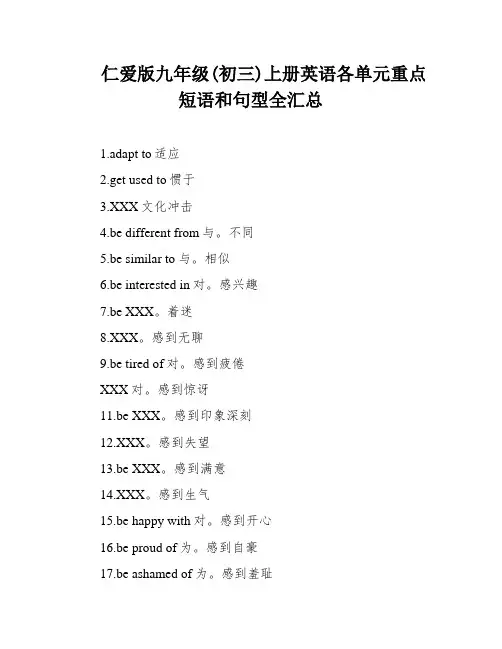
仁爱版九年级(初三)上册英语各单元重点短语和句型全汇总1.adapt to适应2.get used to惯于3.XXX文化冲击4.be different from与。
不同5.be similar to与。
相似6.be interested in对。
感兴趣7.be XXX。
着迷8.XXX。
感到无聊9.be tired of对。
感到疲倦XXX对。
感到惊讶11.be XXX。
感到印象深刻12.XXX。
感到失望13.be XXX。
感到满意14.XXX。
感到生气15.be happy with对。
感到开心16.be proud of为。
感到自豪17.be ashamed of为。
感到羞耻18.be afraid of害怕。
19.be XXX担心。
20.be XXX对。
感到兴奋21.be XXX对。
感到紧张22.be XXX。
感到好奇23.be XXX对。
感到感激24.be sorry for为。
感到遗憾25.be XXX。
负责26.be aware of意识到。
27.be ignorant of不知道。
28.be XXX。
有信心29.be XXX。
不确定30.XXX。
持乐观/悲观态度1.I got lost on my way to the museum。
XXX.2.I need to buy a couple of things from the store before we leave.3.With the development of technology。
XXX.4.With the help of my friends。
I was XXX.5.New York City is one of the XXX.6.XXX.7.I will call you up XXX.8.XXX of water a day to stay hydrated.XXX last night。
but I don't know what.10.What happened to John。
仁爱版英语九年级上册知识点总结范文汇总文档#/26九年级上册(重点短语、句型和语法)UnitlTheChangingWorldTopiclOurcountryhadevelopedrapidly.【重点短语和句型】1.haveagoodummerholiday暑假过得愉快have/habeento去过have/hagoneto去了not...anymore再也不...takephoto照相bytheway顺便问一下takepartin参力口9.around/allover/throughouttheworld全世界10.tellb.omethingabout...告诉某人关于某事11.have/liveahappy/hardlife过着幸福/艰苦的生活decribe...indetail详细描述giveupportto支持...ee...oneelf亲眼看见faraway遥远的kind/ortof各种各样的…notonly...butalo不仅…而且…makeprogre取得进步morethan/over多于develop/improverapidly迅速发展/改善tellb.(not)todoth.告诉某人(别)做某事akb.(not)todoth.要求某人(别)做某事inordertodoth.为了做某事havetodoth.不得不做某事It'+形容词+forb.todoth.对于某人来说做某事是…的whynotdoth.=whydon'tyou为什什么不做某事ucceed/beuccefulindoingth.成功地做某事dreamaboutdoingth.梦想做某事ee/hearb.do/doingth.看见/听见某人做/正在做某事【重点语法】现在完成时一.现在完成时的基本结构肯定句:主语+have/ha+Ved(动词的过去分词)+其他否定句:主语+have/ha+not+Ved(动词的过去分词)+其他一般疑问句:Have/Ha+主语+Ved(动词的过去分词)+其他特殊疑问句:特殊疑问词+一般疑问句语序(have/ha+主语+过去分词+其他),把划线词去掉二.现在完成时的用法现在完成时用来表示过去已经完成的动作对现在造成影响或后果。
仁爱版九年级英语上册重点短词及句型汇总Unit1Topic1 Our country has developed rapidly.重点短语:1.be happy/glad/pleased to do sth. 很高兴做某事2.not bad 还不错e/go/be back 返回4.take place 发生5.by the way 顺便说一下,顺便问一下6.have/has gone to去了某地(还没有回来)Have/has been to 去过某地(已经回来)7.learn from…从……学习8.have no time/money to do sth. 没有时间/钱做某事9.put on 穿上,上映10.in the past 在过去11.at present 现在12.see sth. in personsee sth. oneselfsee sth. with one’s own eyes亲眼目睹13.in the 1960s 在20世纪六十年代14.the living conditions 生活条件15.have a chance/chances to do sth. 有机会做某事have no chance to do sth. 没有机会做某事16.receive/have/get a good education 接受好的教育17.keep in touch with sb. 与某人保持联系get in touch with sb. 与某人取得联系lose touch with sb. 与某人失去联系18.far away 遥远的far away from…距……遥远19.the reform and opening-up 改革开放20.since+时间点/时间段ago/一般过去时的从句for+时间段21.be pleased/satisfied with…对……感到满意22.satisfy one’s needs 满足某人的需求23.on the Internet在网上24.make rapid progress 取得快速的进步25.succeed in doing sth. 成功做某事26.play an important part/role 扮演一个重要的角色27.in one’s spare/free time 在某人的空闲时间29.places of interest/interesting places 名胜古迹30.though/although/even though/even if 虽然,尽管,即使引导让步状语从句,不与but连用,但可与still,yet连用。
九年级上册英语书仁爱版笔记仁爱版九年级上册英语书笔记。
一、Unit 1 The Developing World。
(一)重点单词。
1. proper.- adj. 恰当的,合适的;正确的。
例如:You should use proper language in public.(在公共场合你应该使用恰当的语言。
)2. by the way.- 顺便说一下。
常用来引出一个新的话题。
例如:By the way, have you seen Tom lately?(顺便问一下,你最近见过汤姆吗?)3. volunteer.- n. 志愿者;v. 自愿做。
例如:Many volunteers helped the old people in the nursing home.(许多志愿者帮助养老院里的老人。
)She volunteered to clean the classroom.(她自愿打扫教室。
)(二)重点短语。
1. have a good time.- 玩得高兴,过得愉快。
相当于enjoy oneself或have fun。
例如:We had a good time at the party last night.(昨晚我们在聚会上玩得很开心。
)2. give a report.- 作报告。
例如:The scientist will give a report on environmental protection tomorrow.(这位科学家明天将作一个关于环境保护的报告。
)(三)重点句型。
1. You have just come back from your hometown.(你刚从你的家乡回来。
)- 这是一个现在完成时的句子,表示过去发生的动作对现在造成的影响。
其结构为“have/has+过去分词”,come的过去分词是come。
2. Great changes have taken place there.(那里发生了巨大的变化。
Unit 1重点短语1. take place 发生2. summer holiday 暑假3. more and more... 越来越……4. take photos 拍照5. by the way 顺便问一下6. be back 回来7. take part in 参加8. a group of 一群9. clean rooms 打扫房间10. jump rope 跳绳11. fly a kite 放风筝12. do farm work 干农活13. chat online 网上聊天14. learn from 从……学习……15. put on 上演16. keep in touch with 跟……保持联系17. reform and opening-up 改革开放18. make progress 取得进展,取得进步19. succeed in doing sth. 成功地做了某事20. living condition 居住条件21. ring roads 环形公路22. crowd into 挤进23. medical care 医疗服务24. get lost 迷路25. each other 彼此,互相26. call sb. up 给某人打电话27. not ... any more 不再28. department store 百货公司29. carry out 执行30. control the population 控制人口31. what's more 而且,另外,更重要的是32. one-child policy 计划生育政策33. so far 到目前为止34. take measures to do sth 采取措施做某事35. thanks to 幸亏,由于36. because of 因为;由于37. living conditions 生活条件38. deal with 处理39. as a matter of fact 事实上,其实40. millions of 大量;数以百万计41. stand for 代表42. theater industry 影院行业43. return to work 重返工作岗位44. live a normal life 过正常生活45. in need 在困难中的46. decide on 决定;选定47. medical treatment 治疗;医疗48. provide sb with sth 向某人提供某物49. in order to 为了50. have a problem with 在……(方面)有问题51. on purpose 故意,有意地52. according to 据……所说,按……所报道53. child labor 童工句式梳理1. have/has been to ...【解析】have/has been to ... 意为“(某人)曾经到过……”。
2.have/has gone to ...【解析】have/has gone to ...意为“(某人)已经去……了,现在不在这里(说话的地点)”。
3. keep in touch with【解析】keep in touch with ... 意为“与……保持联系”,强调所处的状态;类似的表达还有get in touch with ... 意为“与……取得联系”,强调动作。
4. So do I【解析】So do I 是倒装句,表示前面提到的肯定情况也同样适合另一个人或物,结构为“so + be / 情态动词/ 助动词+ 主语”。
5. 用population 表达人口【解析】population 为名词,表示“人口,人数”的意思。
当提到“某地有多少人口”时,可用“某地+ has a population of + 数字”或“The population of + 某地+ is + 数字”来表示;形容人口的多少常用形容词large 或small 来修饰population;当提问“某地的人口数量为多少”时,常用what 来提问。
6. be known as【解析】be known as 为固定短语,意为“作为……而出名”,后面一般接人物的职业或称号。
精品句型1. 表达情感(1) What a good girl (she is)!她是一个多么好的女孩啊!(2) Bill is very lazy, and he hates doing home- work after school every day.比尔非常懒惰,他讨厌每天放学后做家庭作业。
(3) — I like playing basketball very much.我非常喜欢打篮球。
— So do I.我也是。
(4) Though he is almost 70, he still keeps doing exercise every day.尽管他快70 岁了,他仍然坚持每天做运动。
2. 表达人口(1) The population of America is smaller than that of India.美国的人口比印度的人口少。
(2) What's the population of Henan Province?河南省有多少人口?(3) China has the largest population in the world.中国拥有世界上最多的人口。
3. 表达个人观点、建议(1) You will get used to living abroad soon.你会很快习惯生活在国外。
(2) Jack is wise. As a matter of fact, I have taken his advice.杰克是明智的。
事实上,我已经接受了他的建议。
(3) I hope you can enjoy your vacation.我希望你能享受你的假期。
语法运用一. 现在完成时(I)一、定义现在完成时主要强调过去发生的动作对现在造成的影响,或过去发生的动作还未结束,一直持续到现在或将来,重点在于对现在的影响。
二、结构have / has + 动词的过去分词三、现在完成时的几种句型1. 肯定句:主语+ have / has + 动词的过去分词+ 其他例如:I have lived here for two years.我住在这里两年了。
2. 否定句:主语+ haven't / hasn't + 动词的过去分词+ 其他。
例如: My classmate hasn't called me yet.我同学还没给我打电话。
3. 一般疑问句:Have / Has + 主语+ 动词的过去分词+ 其他?例如:The three-day holiday is coming. Have you got any idea?三天的假期就要来临。
你有什么想法吗?4. 特殊疑问句:特殊疑问词+have / has + 主语+ 动词的过去分词+ 其他?例如:What have you said to your brother? He is angry now.你对你弟弟说了什么?他现在很生气。
二. 现在完成时(II)already, ever, yet, never 和just 等是现在完成时的标志性副词。
但是,这几个词在句中的含义和用法并不完全相同:总的来说,already,just,ever 和never 在句中的位置一般都是在助动词之后、实义动词之前;already,just 和ever 一般不用于否定句;yet 往往放在句尾。
三. 英文数字的读法(1) 十位数与个位数之间要用连字符。
例如:thirty-four(2) 百位数与十位数之间用and。
例如:five hundred and sixty-two(3) 千位以上的数,从后往前数,每三位加一个逗号,每三位前有一个专有数词:第一个逗号前为千位(thousand),第二个逗号前为百万位(million),第三个逗号前为十亿位(billion)。
(4) 如果hundred,thousand,million,billion 等词前有具体的数词或several 时,须用单数,但是当这些词与of 连用,表示不确切的数目时,须用复数。
例如:seven thousand students 7,000 名学生thousands of visitors 成千上万的游客四. 现在完成时(III)现在完成时可以与for 和since 引导的时间状语(从句)连用,表示开始于过去并持续到现在的动作或状态。
表示延续动作或状态的动词多为延续性动词,如learn, live, know, wait 等。
一、for 和表示一段时间的词组连用表示动作开始于过去某一时刻,一直延续到现在,有可能还要继续下去。
其中,for 常和时间段连用,句中谓语动词要用延续性动词。
例如:I have been in Shanghai for more than 5 years.我已经在上海待了五年多了。
二、since 意为“从……以后,自……以来”,引导的时间状语表示的是一个时间点。
since 可以用作连词,引导时间状语从句;也可用作介词,后面跟表示时间的名词或短语。
例如:The place has changed a lot since I moved here.自从我搬到这里这个地方改变了许多。
【拓展】短暂性动词及短语不能和表示一段时间的状语连用。
当短暂性动词及短语要与表示一段时间的状语连用时,需转换为与之对应的延续性动词及短语。
例如:buy → have, borrow →keep, die → be dead, come / arrive → be here /in, leave → be away from, marry → be married,fall asleep → be asleep 等。
Unit 2重点短语1. lots of 许多2. pour...into... 把……倒进/ 注入……3. have a picnic 去野餐4. cut down 砍伐5. be harmful to... 对……有害6. chemical factory 化工厂7. waste water 污水;废水8. print newspapers 印报纸9. noise pollution 噪音污染10. pop music 流行音乐11. do harm to 损害;伤害12. hearing loss 失聪13. all sorts of 各种各样的14. high blood pressure 高血压15. be bad for... 对……有害16. hurry up 赶快17. give up 放弃18. waste paper 废纸19. soft drink cans 软饮料罐20. spread the message 传播信息21. shut off 停止,关掉22. a short distance 一段很短的距离23. save energy 节约能源24. change into 变成25. pour... into... 把……倒入……26. after all 毕竟27. produce... from... 用……生产出……28. all over the world 全世界29. reach a speed of... 达到……的速度30. run out 用完,耗尽31. remove... from... 从……移除32. face difficulties 面临困难33. different types of 不同类型的34. even though 即使句式梳理1. There be sb. doing sth.【解析】There be 意思是“有”,表示“人或事物的存在”或“某地有某物”。